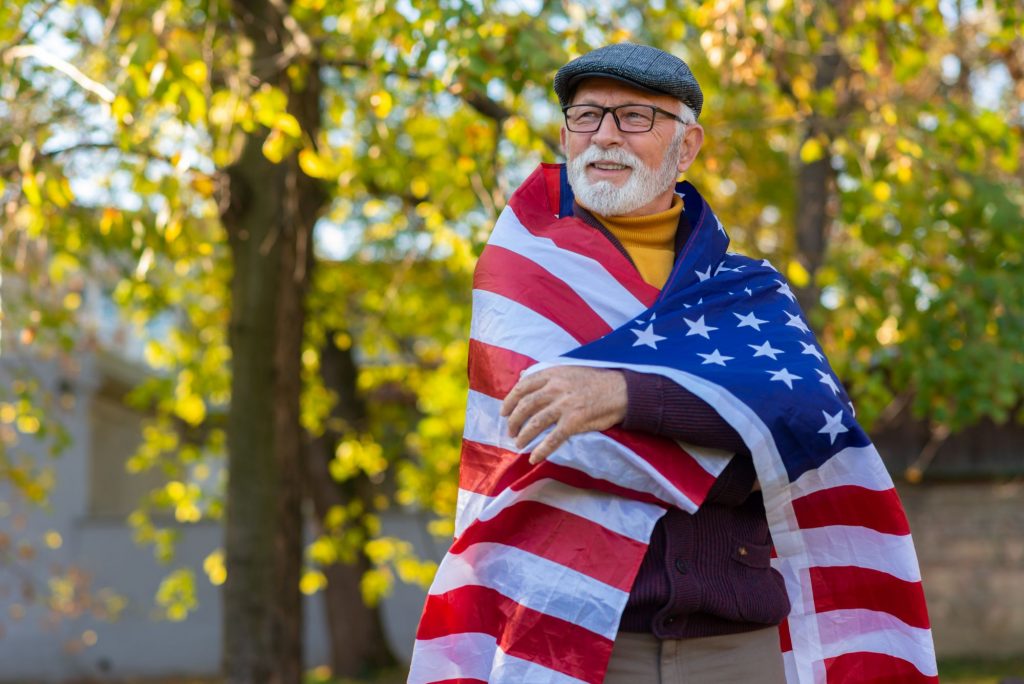US Army Veteran Interview: Gil Conforti
Chuck Olmstead interviews Patriot’s Landing resident Gil Conforti, a retired lieutenant colonel from the U.S. Army. He was born in 1935 in Massachusetts. His father passed away when he was in high school, so he went to work to help support the family. After his 17th birthday, he joined the National Guard. He enjoyed his work, and in 1955 he enlisted in the regular army. He spent 16 months in Korea near the demarcation line, as well as some time in Germany, Vietnam, and Iran.

View Episode Transcript
*The following is the output of transcribing from an audio recording. Although the transcription is largely accurate, in some cases it is incomplete or inaccurate due to inaudible passages or transcription errors.
We welcome to answers for elders. I’m Chuck Olmstead and with me today at Patriots landing is Gil Conforti. He’s retired lieutenant colonel from US Army. Gil, welcome to answers for elders. Thank you. Yeah, but you and I just had an opportunity to meet and you live down here in the Dupont area, near Dupont, and we just wanted to hear your story today. So I always like to have stories with the beginning. And so where is your beginning as far as your life is concerned? My my beginning was in a small town or a midsize town in Massachusetts called Fall River, which was at one time the textile capital of the United States and due to union problems and so on, as we moved into the s became a lesser important textile engineering town. But I was born in one nine hundred and thirty five. My elementary school was in an Irish Catholic school and in Fall Riva, and so with my high school. Unfortunately, in the my sophomore year, maybe junior year in high school, my father passed away, which left me as the oldest child and in a tied in family, which meant I help support the family from that point on. So thirty five, so that would have been a little bit after the war when your dad passed. Yes, like fifty two, F one, fifty two. Okay. So I went to work at that point in time and help support the family, which kind of foreclosed any opportunity at that time to go to college. I had to defer that until later. But one of the things I did do seven days after my seventeen birthday, I joined the Massachusetts National Guard, primarily not patriotically motivated, but primarily to get that check every three months for attending the drills, and I found that I enjoyed what I was doing. was alerted and put on a couple of deployments internally to the State for Hurricane Relief and that kind of thing, and and liked the way that all transpired. So in January one thousand nineteen fifty five, I enlisted in the regular army. Again, there’s some ulterior motives there. The Gi bill from Korea was running out at the end of that month, so enlisting when I did in list made me eligible for that bill, even though I was not a participant in the Korean War. My first overseas assignment, however, was in Korea and I spent sixteen months in the twenty Fourth Infantry Division just north of Seoul, almost on the demarcation line. MMM. Spent sixteen years there and kind of learned my trade. Went from went from being a private etwo when I arrived there to leave in here sixteen months later as a staff sergeant. So I again an ultario motive there. I went over on a troop ship and it took me a good three to five days to get my sea legs and I vowed that I was not going to go through that experience again. so by making sergeant, I was able to fly home as opposed to come home by troopship. I understand. I enjoyed that aspect of the tour. And how long were you there? Sixteen months. At that time, the the tour was based upon the medical evaluation that beyond sixteen months you were prone to get some kind of major illness because of the the war and the way things had been devastated during the course of the war. And what was Korea, the country like at that time? Head it had it. That was about two years after the war ended. So was the country getting back on its feet or what was the what were the conditions? Devastated? Agricultural very, very few major routes of communication, a lot of emphasis on rebuilding, restructuring a political system, but not any great progress made until significantly later. MMM, and another life. I happened to go back there in one thousand nine hundred and eighty eight and several times thereafter, and was amazed at the transformation that occurred. But still at the downtown train station, which is where we got off if we got lucky enough to get a weekend past when I was here the first time, directly across the street was the US oh, which gave out beds to people that came down on a threeday pass at a cost of a dollar fifty in those days, and the walls were still pock marked with fifty caliber machine gun bullets, and that was into the s at that. They had not repaired done. So was it still we’re tension still pretty high even two years since. You know, some people who don’t remember history don’t realize that that the war didn’t end. It was just as anomoustice in armistice. And so were the tensions still high with the north to a great degree. Yes, we were still carrying live ammunition and weapons when we when we were performing our duties and we had to check them in. As you went into the mess hall to eat, you checked it in a rack and it was locked. You picked it up on the way out. So we were still doing fence line patrols at night because there are what we defined as slicky boys or all over the area that would sneak in under the wire and and pilfer tents and all the places. When I first got there there were no permanent buildings. We all lived in squad tents and we were had monkerd on the side of the hill. We built our own quantit hut, if you will, for shelter, built our own mess hall. The Mess Hall was still there when I went back in nineteen eighty eight. In fact, that DMZ still looked the same as it looked in nineteen fifty five and fifty six while I went back in nineteen eighty eight. And that had to do with the mechanism of the armistice and which you couldn’t significantly improve any of the positions that you were in when the armistice was signed. So it’s was an interesting interesting time. So after sixteen months, it’s by then one nineteen fifty seven. What happens next? Well, I went back to another infantry unit at Fort Devans, Massachusetts, the seventy Fourth Regimental Combat Team, which later became the Fourth Regimental Combat Team, which later became the Second Infantry Brigade of the Fifth Mechanized Division. So I spent well, let’s see, I got there in March of nineteen fifty seven and served in a themfort to unit there for for the two years plus and ended up going to OCS one thousand nineteen fifty nine from from Fort Devans. The significant part of the Devon’s assignment as I met and married my wife, who has since passed away. HMM. But that was a significant aspect of of that part of the my military career. And you always thought when you joined the service that you it would be a career. No, in fact I enlisted for three years and at the end of the three years I was at Fort Devans and I came down on orders to go to Germany. But in order to go to Germany to fill those orders, since I had a short time left, I had a voluntarily extend and I did for a year and then I re enlisted. I’m getting I’m getting ahead of myself. I re enlisted first for three years. HMM. Then I had to extend for another year to get to Germany because I was already into the first year of that three year investment. And I did that and then OCS orders came down which negated everything. So in reality, from a financial standpoint, I should have enlisted for six years because I didn’t have to pay anything back after I got commissioned. I see so, but that that’s the facet of that story. That’s interesting. MMMM. So I went to infantry OCS from from their Fort Benning, Georgia, got commissioned and was reassigned to Fort Dicks, New Jersey as a basic training patoon leader. Did that for about a year then and was an instructor on committee system that they had there that gave all the instruction to recruits. I had the machine gun committee, which consisted of an indoor range and then two outdoor two ranges at the further sixten of Fort Fort Dix. So they that was pretty chilly in the wintertime, I bet. But spent spent the better part of two years there and in October one thousand nine hundred and sixty one, I got orders assign them in to the army language school for one year course in the Persian language. So I packed up and left and travel root sixty six out of the glorious West and ended up in Monterey and and actually I had lived in Pacific Grove for the first four or five months in a round of department and then quarters became available at Fort Rd so I moved into quarters there and my third child was born. Wild four door a little bit different than the East Coast, I’m sure a little bit different and and I a lot more fun. So what was the mindset of the of the army at that time going with language school for Persian? Obviously there was, you know, there was a design for that where they seeing more activity happening in the Middle East. Well, I think it was more that they wanted to create a bigger footprint in the Middle East. And as an example of that, my subsequent assignment was to ten Special Forces group and bad toles, Germany, and they had the area responsibility for Iran and that portion of the Middle East. In fact, the be detachment that I was assigned to was in country when I got to bad tolts in Germany, and so I waited there for a month for them to get back before anything was ever done. And I was assigned there as a linguist and I had had some special lots of psyops training. So that was the purpose of the assignment and they had a program design to send people in to augment the Special Forces group in those skills. Well, about three months later the requirement went away and I got reassigned. So I went to Berlin Germany for three years and was in Berlin during the time of the wall, command of the rifle company in the Berlin Brigade and and did some staff work. Interesting. Interestingly enough, the staff work that I had entailed being the desk officer for Spandel prison, which had three war criminals in it at that time, significantly led by Rudolph Hesse Vernavon Sharrock, who was the head of the Hitler youth and Rudolph Speer, who was the industrialist that did manage the the arms manufacturing system. So I also was the desk officer for the trip. I tart tripartite staff and I represented the US on matters of importance to the the European commander and so on. Interesting. Well, you’re listening to an interview with Gilt cunt forty. He’s retired lieutenant colonel US army and we’re sharing about his experience in the late s early s as as an officer in the army. Yeah, so were you proficient in Persian? I was when I graduate. In fact I would they give out one interpret as mos and each class, or at least in the Persian language, and I got the interpret as Mos and in my class, and not because I had any special skills but because I worked my tail off getting the language now and then I didn’t get to the country until six years later, which would have been tough because there’s a lot of things. You probably forgot more than you learned in some ways, and that’s very true. And and many of many of the books that I had and kept to try to review the get on, get back up to speed. We’re not not useful because the idiom had changed and over the course of the time that I’d been away from the language, of different things had happened within the language that made what I knew dated. MMM. But I was able. I was able to make myself known when I needed things and I could converse enough to get my point across. Yeah, so now today, when you see something coming out of Iran on TV or that sort of thing, is it recognizable to you? Words are not, not not the whole memory track, but but I can pick out words. I can get a sensing of some things, not a lot of things anymore, because I guess the level I was trained to was probably a sophomore year, a high school level, and the people that were listening to on the television or a little more advanced than that. Right, right. So after Germany, what happens next? Back to the career course at Fort Benning and then to Fort Bragg for about five months, where I was supposed to be an instructor at the Special Warfare School. However, when they called military personnel to find out how long they’d have me, they were told it’s four months. He’s going to Vietnam on his first trip. So I bought a house, got the family settled and prepared for Vietnam trip. Wow, and that year was what one thousand nine hundred and sixty seven, right in the middle of some of the toughest fighting going on, and I was assigned to the first infant new division, the Big Red One as a company commander in the first of the twenty eighth infant tree and did about a third of my tour in that position and then was reassigned to a traveling road show that went from firebase to firebase, taking new people who were assigned to the division and providing them some training and how the division did things so that when they went out with their units they could they could perform effectively. MMM. I did that for about four months. Got Promoted the major. So I got promoted out of that job and then I was a deputy chief of staff of the division for the remainder of that first tour. So a tour was typically how long? One year. One year. So did you just did you do just one tour in the EN Vietnam dead to the my first tour was with the first division. My second tour was down in the Delta with the Delta Regional Assistance Command and I was a plans officer for about a month and I got pulled out of the put out, pulled out of the cycle and became the special assistant for management for the commanding general. MMM. And did that for my second tour. Significant event there was the we phase down the Delta from about Twentyzero troops to more like five thousand by the end of the tour, and the installations went from about a hundred and fifty down about fifty. HMM. So it was a it was a phase down at that time and several unit it’s came out of Vietnam in that same year. So yeah, yeah, well, now that you see fifty years later, that was with that fifty four, forty years later Vietnam. What are your thoughts as far as have you ever been able to go back to I have not turing and in reality I have no desire to go back. I I’ve got some memories that I prefer not to reawaken. Yeah, I understand. I understand. So your family’s growing at that time. You said three kids. Three kids. Yeah, so there they were growing. How old were they back when you were in Vietnam? Let’s see, oldest was born in fifteen nine. So Hmm. Seven, yeah, yeah, seven, five and four. Yeah. So that reunion coming back from Vietnam, I’m sure, was pretty sweet. It was. It was. It was poignant in a sense that we were all getting back together again, but it was also disruptive in the sense that we were getting ready to move again and this time to another unknown both for me and for the family. That was when I had my two year tour in Iran, from sixty eight to seventy wow. So that was my that was my accompanied tour after my hardship tour in combat. So an accompanied to our means your family goes with yes, and so your younger children, preteens, are on their way to Iran. What city? We were in? Tehran as a base, and that’s where the family was, but I was the operations advised at to the imperially run and ground forces and as a result, I traveled about fifteen days a month, either on exercises with a unit, either on a reconnaissance of various installations, visiting training centers, looking at the TERRIO territorial forces and how they would deployed along the northern tier with Russia. That so was at that time. Was the Shaw in power. Of shaws in power. Things are very, very liberal, although I’m sure that the population at large was not supportive of that. We were able to go to a restaurant, have a bottle of wine or and a good meal and there were no restrictions on our travels and so the view of Americans at that time was pretty good, fairly good. We were providing a lot of equipment to the to the ground forces. We were PR providing a lot of training to the to the forces of all services. Unique, unique experience. As a part of that tour I was able to go with an Iranian rifle company who had the mission of going from Kermanshaw, which is in the northwest of the country, to down along the mountain range that divides Iraq and Iran to a place called desk full, which is in the middle of the central desert, turning west, turning east at that point until we hit the town of Sharraz, which was the major city in that area, dropping south to Banda bushier on the Persian Gulf, meet marrying up with a navy ship and doing an amphibious assault on Carg island in the middle of the Persian go. Wow. So that was fun. Yeah, I kind of enjoyed that. Yeah, so did your family enjoy Iran? They did. The living. The living was good. We were afforded excess housing allowances and other things to accommodate the cost of living that kids. The schooling was good. MM. The teachers were embassy employees. The classes were set up so that they were conducive to learning not only what they were teaching as a part of the the American curriculum, but also the culture and the history of the country. So it was well done. Yeah, yeah, so let’s fast forward a little bit and how did you finish up your your first career as a in the military? I had commanded an infantry battalion out at Fort Louis and had been selected to go to the Army War College. So I went to the war college. Concurrently got my master’s degree in Public Administration at Shippensburg State University and it was at that transition point that I had the opportunity to do the internship for completion of my master’s degree in the mayor’s Office of the city at Tacoma. So I actually lived at home for about four or five weeks, which was the length of that tour, and then went to my next assignment, which was the Pentagon. HMM. So I my last duty assignment was as the executive to the director of training at in Das hops and I retired from there be partially because the mayor had offered me at a job here. So I came back here and went to work for the mayor for a year. And what year was that? That was one thousand nine hundred and eighty one, and I worked for him through nine to nineteen eighty one, into nineteen eighty two, I see, and then things didn’t look too good to me at that point, so I decided that that’s not what I wanted to do for the rest of my life. So I went in the insurance business for a couple of years, Uh Huh, and did okay with that. But they were developing a system that I had been involved in the origination of at Fort Lewis, which was a test bed for a lot of things at that time, you may recall, on and I was asked to come back in and run that program and I did. I worked for another thirteen years at Fort Louis and we instituted a training system that developed hardware and software packages that supported training of a variety of types. The one that I worked on initially had to do with training division commanders to star generals and their staffs and their subordinate commanders and three star generals, the core commanders and their division commanders and staff and it was a software system that was embellished to incorporate terrain files that would allow you to actually maneuver on on the terrain that you’d be employed on, along with the units that you would be used, and they’d be represented in the computer and the computer would make their actions realistic interesting. So I did that for about thirteen years. So you were really at some of the beginning stages of technology, integrating technology into the military. Yes, and that would have I’m sure it’s fascinating for you to see the infancy now, as it’s beginning to mature, what technology is doing for the military in actuality. That’s assists system that was developed while I had the simulation center out here was a system that that has been used to prepare for Desert Storm, for example, the cracking of the berm that the Marine Corps was involved in in that operation was was tested and evaluated on a system that was developed at my simulation center out here in conjunction with Lawrence livermore national laboratories. We dealt with Jet Propulsion Laboratories and passive dinner. I am sure that the that anybody who’s ever been through a battle command training pro program rotation knows what that’s like and that the first one of those for the active component was run out here in the first one of those for the reserve component was run out of here, and the systems of evolved in such a way now that all the activities of a that have occurred in Afghanistan and Iraq and so on have focus the attention on employment and deployment in the field. What we’re happening, what’s happening now is, since much of that is toning down, there’s got to be in need to deal with the China’s and the Russia’s and and the other peer competitors that we have in the world, and the computer system, trainers, system supported training is being renovated and re evolving into a major player in the training field again. Well, it’s interesting to see and I’m sure as a civilian I would be and most of the people listening would be shocked at the the cyber warfare that’s going on on a daily basis, not only against the military but against business as well, by by foreign powers. So it is you know, but to be a part of that, it to be a part of the beginnings of that, I’m sure was pretty gratifying. Yeah, and I think that what what we’ve developed is the system of training first and the means to do that. Training to include being able to communicate with a guy in the field from a base back here and and evolve your systems in your programs based upon his ability to do what he does in the field and thereby improve what he does by testing in a in a computer and a no no threat environment and applying the lessons learned to how he operates in the faild. Yeah, well, I’m sure even then, I don’t know if you were ever involved with drone technology some of that, but it was not. But just to see what they’re able to accomplish now through drones and and even with the army, I’m sure, with with the with the foot soldier being able to use various drones to accomplish their mission. I think the drone technology is the larger scale drone is is an air force issue. The the the smaller drone that you use for gathering intelligence, terrain recognition and so on, is done down to the infantry squad level. MMM, so it’s it is and an exciting thing to watch evolve. What’s going to be more exciting is watching how the defensive systems and the counter systems are developed in the cyber world to make our systems more secure and less less penetrable. Yeah, well, I want to thank you. After you retired of working at Fort Lewis, what what transitioned in your life then? Well, I started playing a lot of Golf, going to the GYM A lot. Good, but I did for about five years. Until that’s about the lifespan of your contacts, until my contacts ran out. I did do some work with a local firm called new definitions incorporated, and as a part of that we did some work with the Czech government. I got to see Checkerslovakia for the first time, which was really interesting in understanding how young and dynamic a population I country has. They were very interested in what we were doing and on top of a lot of it and and ahead of us in some things, so that that was fun. Yeah, I did that for about five years and then basically did a lot of reading and a lot of golf playing and yeah, yeah, just generally doing a living that I couldn’t do for the twenty eight years I spent the arm and the thirteen years of civilian I understand. Well, you seem like you’re still in good health and inactive and that’s a good thing. We’re trying. Yeah, well, Lieutenant Colonel Gil Conforty, I want to thank you for joining us today on answers F ellers radio and being and sharing your story. I promise you one anecdote. That’s right, you were going to tell men conforty. Yeah, every time I went to a training conference in Reno. Well, one time when I was in a helicopter with the assistant division commander of the division out here at Fort Louis, I was asked a question, do you have any relations in Nevada? And coming from the East Coast, that then register it all on me at that time. But come to find out that there is a house of ill repute in Nevada and Reno. It’s run by a JOE CON forty. I see his last name is spelt with a knee as opposed to when I and I get coreyed on that all the time. I understand. Well, probably a distant relative something somehow. It’s got to be. It’s got to be the same family tree because we all came over here about the same time. Exactly, exactly. Well, thank you for joining me today. Thank you for I appreciate the Opportunity
No post found!
Popular Articles About Boomer Blog, and Answers for Elders
Originally published November 10, 2022








